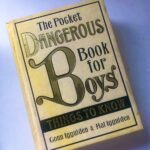The Electric Kool-Aid Acid Test

Instructions
Read the story below at your level. Then, study the key words and phrases. Later, use them in your conversations and writing this week.
Reading
The Electric Kool-Aid Acid Test is a book by Tom Wolfe. It is a true story and the writer was really there. It is about a group of hippies called the Merry Pranksters. Their leader is a man named Ken Kesey. They travel the US in a brightly-painted bus. On the trip, they open their minds with drugs like LSD.
The book is interesting. It tries to show us what the 60’s really felt like. Drugs like LSD were very popular at that time. They changed American music, writing, and thinking. They were part of the peace, and free-speech movements.
Flesch-Kinkead – Grade 3
The Electric Kool-Aid Acid Test is book by Tom Wolfe. It follows a group of hippies called the Merry Pranksters. They are led by a man named Ken Kesey. They travel around the US in a brightly-colored bus. During the trip, they experiment with mind-expanding drugs like LSD.
The book is interesting, because it uses a style known as New Journalism. The writing tries to give us the feeling of really being there. The drug use of the 1960’s greatly affected American culture in music, writing, and thought. It is related to the anti-war and free-speech movements of the time.
Flesch-Kinkead – Grade: 5
The Electric Kool-Aid Acid Test is a 1968 Tom Wolfe book. It follows Ken Kesey and his group of hippies, called the Merry Pranksters. They travel around the US in a brightly-colored bus, and experiment with mind-expanding drugs such as LSD.
The book’s style is noteworthy, because it attempts to recreate the experience of being there, in a style known as New Journalism. The writing often seems mixed up. However, this gives the reader a sense of the thoughts and experiences of people at the acid tests.
The drug craze of the 1960’s had a very strong influence on American culture in music, writing, and thought. It is closely connected to the anti-war and free-speech movements of the time.
Flesch-Kinkead – Grade: 7
The Electric Kool-Aid Acid Test is a 1968 Tom Wolfe book which follows a group of hippies called the Merry Pranksters led by Ken Kesey, as they travel around the US in a brightly-colored bus experimenting with consciousness-expanding drugs such as LSD.
The book is significant in style as it attempts to recreate the mood or feeling of the time and place in a style known as New Journalism. The prose is often confusing or disjointed but gives the reader a sense of the thoughts and experiences of those present for the acid tests.
Culturally, the drug craze of the 1960’s had a particularly strong influence on American music, writing, and thought. It is closely linked to the anti-war and free-speech movements of the time.
Flesch-Kinkead – Grade: 11
Key Terms
true story – non-fiction / real
• I love non-fiction movies. Documentaries are the best.
• “Into the Wild” is a true story about a young man who travels alone.
hippies – people in the 1960’s / not mainstream / long hair / drugs
• My cousin is a hippie. She loves peace and she wears funny clothes.
• Hippies often had long hair and used drugs.
prank – a kind of joke
• I played a prank on my brother. I switched the sugar and salt.
• My sister is a prankster. She always makes me laugh.
experiment – try something new / a scientific test
• Scientists experimented with new drugs to help blind children.
• I’m experimenting in the kitchen with some new spices.
mind-expanding – opening us to new ways of thinking or new ideas
• My first trip abroad really expanded my mind. I’m so glad I went.
• Steve Jobs said LSD was a mind-expanding experience.
movement – a change in thinking to change a culture
• The Civil-Rights movement aims to give everyone equal rights.
• The Suffrage movement gave women the right to vote.
noteworthy – interesting, notable, worth writing down
• You made some noteworthy comments in that meeting. Good job.
• Nothing noteworthy happened last Friday. It was just a quiet night.
attempt – try / make effort to do or complete something
• The racer attempted to pass the other cyclists near the end of the race.
• I didn’t win but I made a good attempt.
X I’m going to attempt this new hot sauce.
O I’m going to try this new hot sauce.
mixed up – confused or confusing / out of order
• He had a lot of drinks and was all mixed up about how to get home.
• I mixed up the documents. It was a silly mistake.
consciousness – awareness of the world
• After the accident, she wasn’t conscious for several hours. (adjective)
• New experiences like travel and reading will greatly expand your consciousness of the world. (noun)
significant – noteworthy / worth attention / large enough to be easily noticeable
• There was a significant change in our sales numbers last month.
• Mark Twain made a significant contribution to American literature.
prose – regular written or spoken language (not poetry)
• I really prefer poetry to prose.
• In this class, we’ll study the poetry and prose of Beat writers.
disjointed – not in a clear order
• After he hit his head, his words were all disjointed. We couldn’t understand what he wanted to say.
• Your writing is a little disjointed. The sentences don’t connect well.
Like this story? Let’s talk about it in class.
Ideas to discuss:
• 1960’s counterculture
• Road trips
• Pranks
• Medical use of drugs
Example: Microdoses of LSD are used to fight Alzheimer’s.
• Writing styles
• Books you’ve read
• Peace / free-speech
• American music / books / poetry


